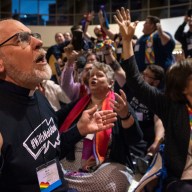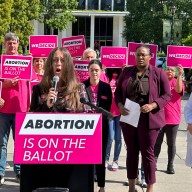SAN JOSE, Costa Rica – Honduras’ interim government rejected a mediator’s proposal to reinstate ousted President Manuel Zelaya and form a national unity government, throwing negotiations on settling the political crisis into doubt Saturday night.
Costa Rican President Oscar Arias, who is mediating the U.S.-backed talks, said both sides agreed to hold more talks Sunday, but he acknowleged they were far apart over how to end the dispute over a June 28 coup that toppled Zelaya and send him int exile.
“We have to make an effort to bring the positions closer,” Arias, who won the 1987 Nobel Peace Prize for his role in ending Central America’s civil wars, said at the end of Saturday’s round of talks.
Zelaya had issued a midnight Saturday deadline for a deal, saying if he wasn’t restored to power by then he would declare the talks failed. But his negotiators apparently agreed to extend the deadlline.
The exiled leader has vowed to slip back into Honduras to reclaim the presidency if the talks fail, and interim president Roberto Micheletti promises to arrest him upon arrival. The crisis over the June 28 coup has become a key test for democracy in Latin America and for U.S. diplomacy in the region.
During Saturday’s talks, Arias issued a statement proposing a plan that would let Zelaya serve out the final months of his term, move up elections by one month to late October, grant amnesty for all political crimes committed before and after the June 28 coup, and include representatives of the main political parties in a reconciliation government.
But the proposal would limit Zelaya’s power, obliging him to cede control of the military to an electoral court a month before the elections to ensure impartiality. He would also have to renounce his plan to hold a referendum on retooling the constitution, which was the spark that launched the coup after the Supreme Court, military and Congress all objected to the vote. Zelaya has said he is willing to cancel plans for the referendum.
Asked about the idea of having Zelaya return to Honduras as president with a reconciliation government, Honduras’ interim Assistant Foreign Minister Martha Lorena Alvarado said: “Impossible.”
“The reinstatement of Zelaya, as we have maintained and now repeat, is not negotiable … there is no possibility of him returning to Honduras as president,” Alvarado said.
Zelaya says any solution to the crisis must involve his return to power.
A Zelaya representative, Enrique Flores, said his side had accepted Arias’ plan “in principle” but complained that Micheletti’s government was balking at the key point: allowing Zelaya’s return to power. He said that would kill the negotiations.
“We will declare the talks a failure” if there is no progress on that issue, Flores told The Associated Press. “If they don’t accept the first point, the mediation has no purpose.”
Zelaya’s side said they accepted the plan in principle, and were ready to later discuss the points in detail.
Before Alvarado’s sharp comments, a representative of Honduras’ interim government said her delegation lacked the authority to accept most of Arias’ proposals, since decisions on amnesty, changed election dates and permission for Zelaya to return despite warrants for his arrest needed the approval of Honduras’ courts or Congress.
“It is up to Congress to grant amnesties, so we cannot commit to something that intrudes on the powers of other bodies,” former Supreme Court President Vilma Morales told The Associated Press. “We cannot make commitments that ignore the jurisdiction of the electoral tribunal, and it is also up to Congress to discuss and legislate and issue a decree on moving up the elections.”
The talks, which had the backing of the Obama administration, the Organization of American States and much of the world community, though some leftist leaders denounced them as a U.S.-backed trap for Zelaya, a wealthy rancher who moved to the left after being elected.
The talks in Costa Rica’s capital were taking place under extreme pressure after Zelaya issued an ultimatum late Friday that if he was not returned to the presidency by midnight Saturday he would declare the talks a failure and return to Honduras anyway.
“I am going back to Honduras, but I am not going to give you the date, hour or place, or say if I’m going to enter through land, air or sea,” Zelaya said at a news conference Friday night at the Honduran embassy in Nicaragua.
Zelaya’s wife, Xiomara Castro, implied the return was imminent, telling demonstrators in the Honduran capital Saturday that “President Zelaya will be here in a few hours despite the bayonets.”
Zelaya did not say what steps he would take once on Honduran soil. But earlier in the week, he said Hondurans had a constitutional right to rebel against an illegitimate government.
The Honduran military thwarted his attempt to fly home July 5 by using vehicles to block the runway at the capital’s airport, preventing his plane from landing in Tegucigalpa.
Zelaya’s supporters have staged near daily protests demanding his return, and about 3,000 blocked traffic on one of the main boulevards in the capital Saturday chanting slogans in favour of the ousted leader.
“Nothing will come out of the negotiations and people know that,” said Cesar Silva, who helped organize the protest. He said he expected Zelaya to return to Honduras after midnight Saturday.
About 300 Zelaya supporters chanted slogans outside Arias’ house as the meeting started.
“These negotiations have been put together to legitimize the coup government and all they are looking for is an exit that doesn’t include their punishment or reinstating Zelaya,” said John Vega, a Costa Rican student.
Honduras’ Supreme Court issued an arrest warrant for Zelaya before the coup, ruling his effort to hold a referendum on whether to form a constitutional assembly was illegal. The military decided to send Zelaya into exile instead – a move that military lawyers themselves have called illegal but necessary.
Many Hondurans viewed the proposed referendum as an attempt by Zelaya to push for a socialist-leaning government similar to the one his ally Hugo Chavez has established in Venezuela.
–
Associated Press writers Diego Mendez in San Jose, Costa Rica, and Mark Stevenson in Tegucigalpa, Honduras, contributed to this story.
















